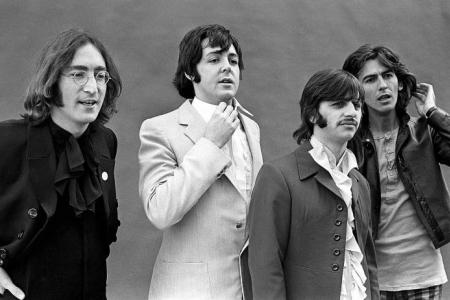Still with the Beatles: Why the Fab Four still matter after 50 years
You could argue that The Beatles were not the biggest band on the planet, but you'd lose.
The Liverpudlian four-piece - John Lennon, Paul McCartney, George Harrison and Ringo Starr - triggered a musical revolution in the 1960s, and became the most commercially successful and critically acclaimed act in the history of pop.
Today they are cultural icons, attracting new fans each day and still influencing musicians the world over.
More than 50 years on, Beatlemania is very much alive - just with less screaming than in the 60s.
The band's 50th anniversary celebrations have been accompanied by unprecedented international fanfare.
You could even take your pick of anniversary, for the 50 years since they first recorded at Abbey Road in 1962 or this year's 50th of the US invasion.
Fans throng to cities around the world for Beatles-themed festivals.
This year, two Beatles musicals have hit our shores - Beatlemania On Tour played at Marina Bay Sands earlier this month while smash hit West End production Let It Be starts a week-long run at the Resorts World Sentosa next Wednesday. (See report on facing page.)
Demand for their music sees constant reissues, from digital to lovingly remastered older format.
For example, The Beatles in Mono, out now in stores, is a landmark limited-edition 14-LP box-set. Vinyl! In mono!
And yet these are objects of much desire. (Go to page 28 to see how you can win a copy.)
So what is it about The Beatles that has created such enduring popularity?
THE MUSIC
Obviously. The tunes matter.
British newspaper The Telegraph once described the band's original compositions as "greater than the sum of their considerable parts.
"The music just overwhelms analysis, it burst through with a pulsating vitality of its own, it comes alive again every single time."
The Beatles' songs are melodic, lyrical, emotionally rich and defy any pigeonholing. They span genres (sometimes within one song), from warm ballads to bubblegum pop, psychedelic rock to orchestral compositions.
The foursome dared to ditch formula for experimentation.
More than their peers, they absorbed influences and became influencers.
The best part about their all-encompassing music is that everyone has his or her favourite version of The Beatles.
Like the mop-top days in the early 60s, when they burst forth with youth and raw energy.
Upbeat tracks such as She Loves You, and Can't Buy Me Love were simple, jangly and filled with punchy hooks.
Or the flower-power era of the late 60s, when their creative juices powered them to make haunting, hallucinatory-like tunes I Am The Walrus, Lucy In The Sky With Diamonds and Tomorrow Never Knows.
Considering they were together for only eight years, they looked and sounded totally different from how they started out.
Over the same period, other bands just look a bit older. The Beatles utterly transformed.
THE PERSONALITIES
Good songs can take you only so far.
They also won over the world because they were whip-smart and charming in interviews.
Each also had their particular trait, something every boy band since has tried to emulate.
McCartney, "the cute one", had the most number of shrieking girl fans. He was also the practical one in later years, business-minded and media-savvy.
Lennon was philosophical, poetic and abrasive.
Harrison was thoughtful, Zen-like and the one most influenced by Indian culture and music.
As for Starr, he was the "easy-going Beatle".
He was often the mediator, possibly because he posed no threat as a songwriter to the other three. There is the famous, if cruel, Lennon quip: "(Ringo's) not even the best drummer in The Beatles."
But it is often the Starr sung tracks that serves as an introduction to the band, with Yellow Submarine and Octopus's Garden being the most kid-friendly tunes.
THE MYTHOS
Even with so much information available, there can still seem to be more mystery about The Beatles than any other band.
Eight years and 13 original albums, means the desire for every scrap and alternate song take has been sought out and bootlegged.
But there are said to be tunes which have yet to see the light of day - including the near-mythical experimental piece, Carnival Of Light.
A large part of the fascination stems from the McCartney-Lennon rivalry.
The eventual split in 1970 had been attributed to Lennon's wife, Yoko Ono. Avant-garde artist Ono, now 81, denied those accusations in a 2010 interview with Daily Mail: "The Beatles were a group made up of four very complex men, and my small hand could not have broken these men up."
But the answer of "they drifted apart" does not seem to wash with fans, who wonder how the best and most productive of friendships turned into acrimony.
To hear how bad things were between the two, listen to Lennon's scathing McCartney takedown, How Do You Sleep - ironically on his solo Imagine album, which also contained the eponymous love and harmony anthem.
Ono also said the two "made peace", adding that it was McCartney who "saved her marriage with John".
Then of course there is the matter of what could have been. What if they had not broken up?
Lennon's murder in 1980by deranged fan Mark David Chapman robbed the world of a talent, a vocal advocate of peace and a reunion.
Would the reunion have added or ruined a legacy? But it's the not knowing that makes the speculating so tantalising.
Get The New Paper on your phone with the free TNP app. Download from the Apple App Store or Google Play Store now


